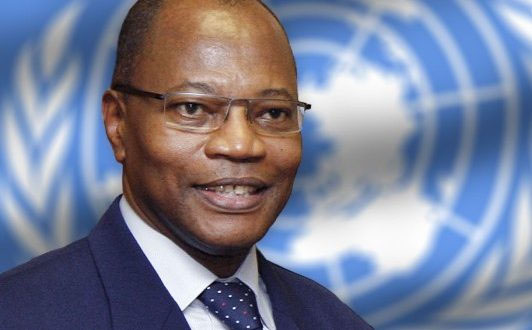Dr. Mohammed Ibn Chambas
Special Representative of the United Nations Secretary-General and Head of the United Nations Office for West Africa and the Sahel, Dr. Mohammed Ibn Chambas, has stated that the coronavirus pandemic is Exacerbating socio-economic challenges in Africa.
He was speaking to the Rotary Club of Accra, Airport recently in a virtual meeting.
He said the pandemic
continues to inflict pain and cause significant disruptions to livelihoods of families, communities and nations.
Dr Chambas noted that in these difficult times, the United Nations stands in solidarity with all peoples and countries, particularly those of the African Region.
He reiterated the UN’s continued commitment to a collaborative and mutually reinforcing partnership to put an end to the pandemic.
“We are all witnesses to a Covid-19 pandemic which beyond being an acute health crisis is having profound socio-economic, political and security implications for countries and their citizens,” he stated.
Primarily, he explained, Covid-19 pandemic is an acute health crisis of epic proportions because of the accelerated rate of transmission, mortality, its increased risks to public health and the unrelenting pressure it places on health systems and their capacities to respond. If the health systems of richer and developed countries have been overwhelmed by this pandemic, one can only imagine the debilitating effect it has on systems of poorer and less developed countries like those in our region.
With very limited investments over the years, far below the 15 per cent threshold of annual expenditure agreed 19 years ago by African countries in the Abuja Declaration, health systems on the continent and particularly the West African and Sahel region have suffered from years of under resourcing which has considerably weakened their ability to meet even the basic health needs of the population,” Dr. Chambas said.
Unfortunately, due to conflict in places like the Sahel and the Lake Chad Basin and other challenges, some health systems had already been severely degraded to the point of being nonfunctional.
Covid-19 will exacerbate this situation, he bemoaned.
Beyond health, Head of the United Nations Office for West Africa and the Sahel believes Covid-19 is testing Africa’s governance models and systems.
It is interrogating the proactiveness and responsiveness of established governance systems to crisis and their degree of success in protecting their populations from public health hazards and emergencies, according to Dr Chambas.
The pandemic which is seriously disrupting business continuity, risks undermining the capacity of governance systems both at the centralized and decentralized levels to respond in the short term and even recover in the long term, he said.
“It is worth recalling that we are in a region which, prior to Covid-19, was already experiencing daunting governance challenges which oftentimes constituted some of the main drivers of conflict,” he stated.
The pandemic will exacerbate these challenges and with a crippling effect on service delivery and functioning of these systems.
Therefore, ensuring that governance structures continue delivering basic services such as healthcare, education, pipe-borne water, electricity and social amenities in the immediate and long term is extremely critical within the current climate, he said.
Unfortunately, the fragile states are expected to be more exposed to the shocks of Covid-19 than others, says Dr. Chambas.
According to indices culled from the Fund for Peace in its 2019 Fragile State Index ratings, a ranking of 178 countries across 12 indicators of the risks and vulnerabilities faced by individual nations, eight (Mauritania, Liberia, Cote d’Ivoire, Mali, Guinea Biss.
By Melvin Tarlue


